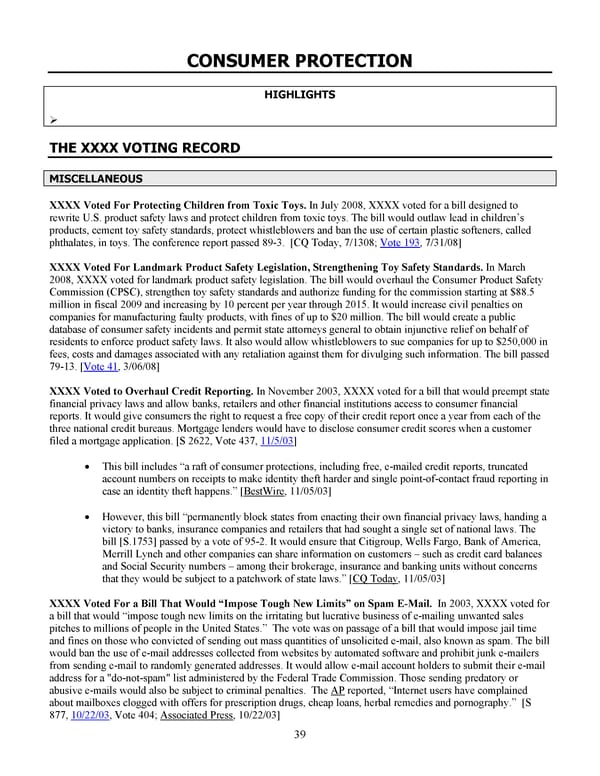CONSUMER PROTECTION HIGHLIGHTS THE XXXX VOTING RECORD MISCELLANEOUS XXXX Voted For Protecting Children from Toxic Toys. In July 2008, XXXX voted for a bill designed to rewrite U.S. product safety laws and protect children from toxic toys. The bill would outlaw lead in children’s products, cement toy safety standards, protect whistleblowers and ban the use of certain plastic softeners, called phthalates, in toys. The conference report passed 89-3. [CQ Today, 7/1308; Vote 193, 7/31/08] XXXX Voted For Landmark Product Safety Legislation, Strengthening Toy Safety Standards. In March 2008, XXXX voted for landmark product safety legislation. The bill would overhaul the Consumer Product Safety Commission (CPSC), strengthen toy safety standards and authorize funding for the commission starting at $88.5 million in fiscal 2009 and increasing by 10 percent per year through 2015. It would increase civil penalties on companies for manufacturing faulty products, with fines of up to $20 million. The bill would create a public database of consumer safety incidents and permit state attorneys general to obtain injunctive relief on behalf of residents to enforce product safety laws. It also would allow whistleblowers to sue companies for up to $250,000 in fees, costs and damages associated with any retaliation against them for divulging such information. The bill passed 79-13. [Vote 41, 3/06/08] XXXX Voted to Overhaul Credit Reporting. In November 2003, XXXX voted for a bill that would preempt state financial privacy laws and allow banks, retailers and other financial institutions access to consumer financial reports. It would give consumers the right to request a free copy of their credit report once a year from each of the three national credit bureaus. Mortgage lenders would have to disclose consumer credit scores when a customer filed a mortgage application. [S 2622, Vote 437, 11/5/03] This bill includes “a raft of consumer protections, including free, e-mailed credit reports, truncated account numbers on receipts to make identity theft harder and single point-of-contact fraud reporting in case an identity theft happens.” [BestWire, 11/05/03] However, this bill “permanently block states from enacting their own financial privacy laws, handing a victory to banks, insurance companies and retailers that had sought a single set of national laws. The bill [S.1753] passed by a vote of 95-2. It would ensure that Citigroup, Wells Fargo, Bank of America, Merrill Lynch and other companies can share information on customers – such as credit card balances and Social Security numbers – among their brokerage, insurance and banking units without concerns that they would be subject to a patchwork of state laws.” [CQ Today, 11/05/03] XXXX Voted For a Bill That Would “Impose Tough New Limits” on Spam E-Mail. In 2003, XXXX voted for a bill that would “impose tough new limits on the irritating but lucrative business of e-mailing unwanted sales pitches to millions of people in the United States.” The vote was on passage of a bill that would impose jail time and fines on those who convicted of sending out mass quantities of unsolicited e-mail, also known as spam. The bill would ban the use of e-mail addresses collected from websites by automated software and prohibit junk e-mailers from sending e-mail to randomly generated addresses. It would allow e-mail account holders to submit their e-mail address for a "do-not-spam" list administered by the Federal Trade Commission. Those sending predatory or abusive e-mails would also be subject to criminal penalties. The AP reported, “Internet users have complained about mailboxes clogged with offers for prescription drugs, cheap loans, herbal remedies and pornography.” [S 877, 10/22/03, Vote 404; Associated Press, 10/22/03] 39
 HRC vote skeleton Page 45 Page 47
HRC vote skeleton Page 45 Page 47